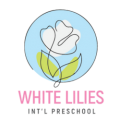Learning and Development
At Kids Care we recognize that children learn and develop in different ways and have their own learning styles. We value all areas of learning and development equally and understand that they are often linked.
The Kids Care International Pre-school strives to offer children an opportunity to develop in an environment planned with their physical, mental, social, sensory and emotional needs in mind. The program provides experiences with the intent of meeting the needs of all attending preschoolers. It is a language-based, developmental preschool. This means that activities are implemented with attention to different needs, interests and developmental levels of individual children as well as the group. Research indicates that preschool children learn best through a multi-sensory approach. As examples, preschool activities may include playing with homemade play-dough, water, sand, shaving cream, rice and flour. Music and singing are important elements to the pre-school curriculum, as the children learn listening and language skills through these activities. Phonemic awareness is taught through rhythmic beat and familiar patterns heard in routines and everyday experiences. Preschool children have an opportunity to attend school assemblies.
All preschool experiences promote an environment which:
- Develops creativity, interest and joy of learning through an interactive process with the environment using all the senses. Discovery of relationships through direct experiences and the promotion of choices are encouraged.
- Enhances communication skills through fostering meaningful dialogues with children and adults, listening to and discussing stories, participating in group play, field trip, language experience activities, relating to pictures, role playing and pretending, as examples.
- Develops self-control and responsibility through gentle guidance by setting clear, consistent, fair limits for behavior and expectations, redirection to more acceptable behavior if necessary, guiding children to resolve conflicts and modeling skills that help children solve problems. All staff use a philosophy of positive behavior support.
- Develops fine and gross motor skills by providing a balanced amount of large and small muscle activities. Gross motor activities might include running, jumping, balancing and group games. Fine motor skill development may be enhanced through artwork, use of scissors, solving puzzles, block building, cooking, as examples.
- Introduces pre-academic skills and expose children to letter sounds, numbers, the alphabet, shapes and colors. Examples of pre-academic skills are number concepts, such as one to one correspondence and counting meaningful objects. Aspects of language arts are presented through exposure to stories, poetry and provision of a print-rich environment.
- Encourages appropriate interaction with other children and adults through opportunities to communicate, practice social skills such as cooperating, sharing and helping others make positive choices.
- Teaches problem-solving and decision-making skills through individual choices of activities and encouragement of child-initiated investigation, exploration, questions and making suggestions.
- Enhances concern for others through recognition of feelings, demonstration of respect, ability to share, promotion of understanding of commonalities and acceptance of differences between individuals and groups.
- Encourages the development of a positive self-concept through demonstration of respect for and acceptance of children. This lends to a positive and supportive relationship between teachers and children which is crucial to social and emotional growth.
